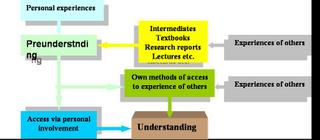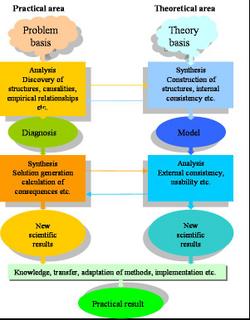The literature based research methods in the scientific management, manufacturing and social science research are heavily dependent on the knowledge of the researcher. This research is heavily dependent on people so that a social science that makes the studies based towards an approach to the behavioural studies. This type of studies is more qualitative nature than a quantitative. Qualitative research and methods have the distinguished feature of unknown possible solutions and results (Gunnarsson, 2002). Gunnarsson (2002) also states his view on qualitative approach advantage that the qualitative approach considers the entirety in a way not possible in quantitative research. On the other hand quantitative method approach gives an objective measurement of the probability of the truth of the result. Qualitative research methods often contain for example, interviews and observations and it is possible that the researcher has to change methods during the project during its implementation (Gunnarsson, 2002).
Literature based on phenomenological paradigm results from a qualitative approach. Phenomenological paradigm assumes that social reality is in our minds; a reaction to the positivistic paradigm. Therefore, the act of investigating reality has an effect on that reality and considerable regard is paid to the subjective state of the individual (Hussey and Hussey, 1997). Most of the research depends on the knowledge of researcher. Gunnarsson (1991) separates the researcher’s knowledge into understanding and preunderstanding. Preunderstanding represents the knowledge insight and experience before taking part in a research project. It also refers a certain attitude and a commitment on the part of researcher’s personal experience as an essential element in the process of collecting and analysing data. Gunnarsson (1991) also emphasizes that the researcher should have solid base of preunderstanding however not to be its slave. This concept refers that researcher, should have open attitude and if needed, should change the point of view and review the knowledge base that forms the preunderstanding and also aware of paradigm, selective perception and his/her defence mechanisms. Understanding represents to the knowledge which develops during the assignments and program. It is also depended on preunderstanding since the experience and involvement that leads to understanding. As stated earlier, it can make clear that researcher who achieves understanding becomes preunderstanding into  the next phase of research project.
the next phase of research project.
 the next phase of research project.
the next phase of research project. Preunderstanding and understanding are based on the experience of others which is gained for oneself through literature, discussion, involvement and other sources. Chalmers (1995) draws attention that observations are dependent upon the theoretical knowledge of the observer and therefore it is very important to have the correct theoretical background before conducting empirical research. Jorgensen (1992) states by combining a practica l and theory based approach.
l and theory based approach.
 l and theory based approach.
l and theory based approach. Theoretical research represents the development of new concepts depends upon scientific knowledge. These new results of knowledge can be used for practical diligence. These learning outcomes represent a higher intellectual level than understanding and diligence because it requires an understanding of both the content and structure. Jorgensen (1992) describes the process of research as an ongoing iterative process of analysis and synthesis in these areas.
Synthesis relates to the ability to bring different parts together to form a new whole. This may involve a set of abstract relations in human behaviour and performance. These learning outcomes in this range emphasis creative behaviour express precisely new patterns and structures. Gummesson (1991) refers five types of preunderstanding based on knowledge and personal characteristic which are necessary in order to fully understand process in organisation which are as follows:
Knowledge of theories;
Knowledge of techniques;
Knowledge of institutional conditions;
An understanding of social patterns;
Personal attributes;
Effective research is not disciplinary, interdisciplinary, or multidisciplinary; it is transdisciplinary (Ackoff, 1999). In the process of development of understanding to result in correct, a number of issues relevant to management science, physiology and scientific issues of more practical nature, related to the conducted research and discussed together with scientifically sound research have been taken into account and dealt with.
Synthesis relates to the ability to bring different parts together to form a new whole. This may involve a set of abstract relations in human behaviour and performance. These learning outcomes in this range emphasis creative behaviour express precisely new patterns and structures. Gummesson (1991) refers five types of preunderstanding based on knowledge and personal characteristic which are necessary in order to fully understand process in organisation which are as follows:
Knowledge of theories;
Knowledge of techniques;
Knowledge of institutional conditions;
An understanding of social patterns;
Personal attributes;
Effective research is not disciplinary, interdisciplinary, or multidisciplinary; it is transdisciplinary (Ackoff, 1999). In the process of development of understanding to result in correct, a number of issues relevant to management science, physiology and scientific issues of more practical nature, related to the conducted research and discussed together with scientifically sound research have been taken into account and dealt with.
Analysis of important written material has been reviewed according to scientific systems called complete analysis described by Bjornsson et al (1994).
A complete analysis has been used to set up evidence and explanation constructing in read as well as written material however there are possible dangers of only managing theoretical studies. According to Gummesson, (1991) the researcher runs the risk of penetrating a vicious circle of academic research, where researchers quote each other without adding new, consistently tested material, which may lead to inaccurate results. Another risk is that it may miss a lot of facts or misunderstand facts because of lack of practical experience, risking the deduction of incorrect conclusions.
A complete analysis has been used to set up evidence and explanation constructing in read as well as written material however there are possible dangers of only managing theoretical studies. According to Gummesson, (1991) the researcher runs the risk of penetrating a vicious circle of academic research, where researchers quote each other without adding new, consistently tested material, which may lead to inaccurate results. Another risk is that it may miss a lot of facts or misunderstand facts because of lack of practical experience, risking the deduction of incorrect conclusions.

No comments:
Post a Comment